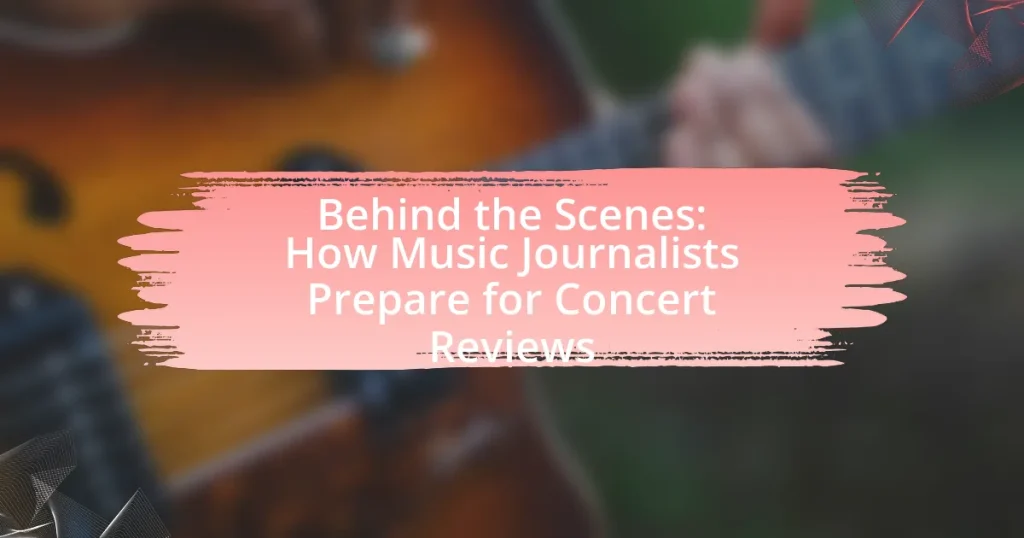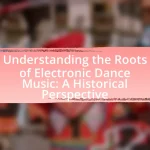The article focuses on the essential role of music journalists in preparing for concert reviews, detailing their research methods, analytical skills, and the tools they utilize. It outlines the preparation process, including gathering background information on artists, understanding venue dynamics, and the importance of audience engagement. Additionally, the article discusses the challenges journalists face, such as time constraints and ethical considerations, while emphasizing best practices for writing informative and engaging reviews. Overall, it provides a comprehensive overview of the intricacies involved in music journalism and concert critique.
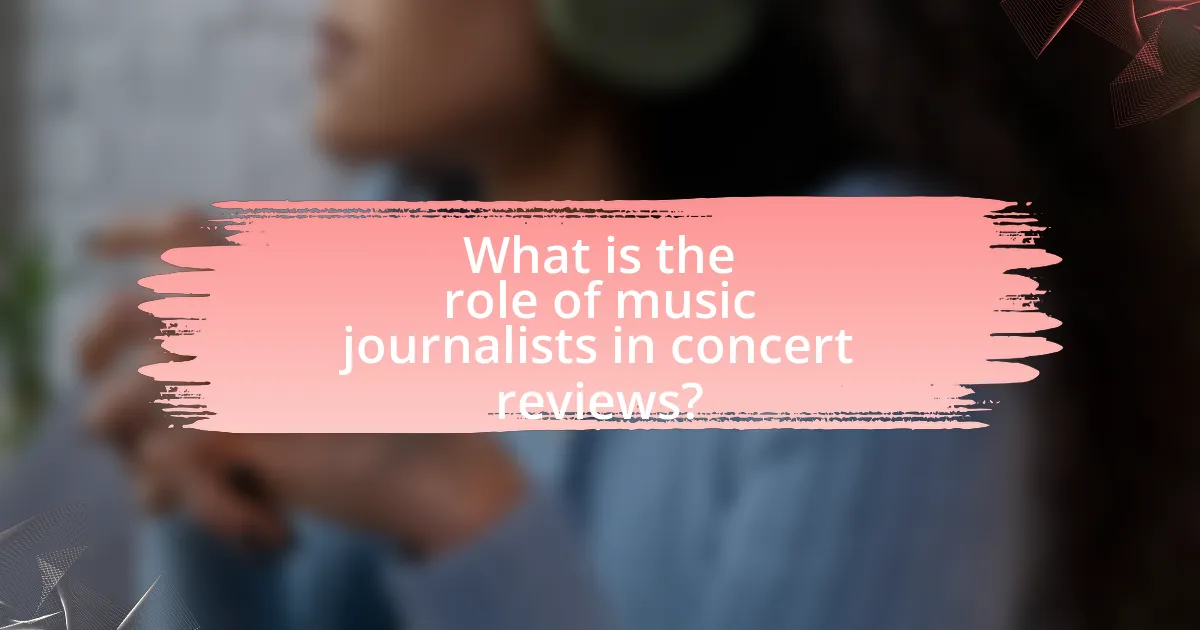
What is the role of music journalists in concert reviews?
Music journalists play a crucial role in concert reviews by providing critical analysis and context for live performances. They observe and evaluate various elements such as the artist’s stage presence, audience engagement, and overall sound quality, which helps inform readers about the concert experience. Their insights contribute to the broader understanding of the music scene, as they often compare performances to previous shows or albums, offering a historical perspective. Additionally, music journalists often conduct interviews with artists and industry professionals, enriching their reviews with firsthand accounts and expert opinions. This combination of observation, analysis, and contextualization ensures that concert reviews are informative and engaging for the audience.
How do music journalists prepare for a concert review?
Music journalists prepare for a concert review by conducting thorough research on the artist, the venue, and the setlist. This preparation includes reviewing the artist’s previous performances, understanding their musical style, and gathering background information about any recent developments in their career. Additionally, journalists often arrive early to observe the venue’s atmosphere, sound quality, and audience engagement, which are crucial for an accurate review. They may also take notes during the performance, focusing on key moments, audience reactions, and the overall energy of the concert to provide a comprehensive analysis.
What research do music journalists conduct before attending a concert?
Music journalists conduct extensive research before attending a concert to ensure comprehensive coverage and insightful reviews. This research typically includes gathering information about the performing artist’s background, recent releases, and notable achievements, which helps contextualize the performance. Additionally, journalists often review setlists from previous shows to anticipate song selections and analyze the artist’s performance style. They may also investigate the venue’s history and acoustics, as well as any relevant local music scene dynamics. This preparation enables journalists to provide informed commentary and critiques, enhancing the quality of their reviews.
How do journalists gather background information on the artist or band?
Journalists gather background information on artists or bands primarily through research, interviews, and analysis of existing media. They utilize online databases, music streaming platforms, and social media to collect data on the artist’s discography, influences, and public persona. Additionally, journalists often conduct interviews with the artists themselves, their management, or collaborators to gain firsthand insights. This method is supported by the fact that direct quotes and personal anecdotes enrich the narrative and provide authenticity to the coverage. Furthermore, reviewing past articles, press releases, and fan interactions helps journalists understand the context and evolution of the artist’s career, ensuring a well-rounded perspective in their reporting.
What skills are essential for music journalists when writing reviews?
Essential skills for music journalists writing reviews include strong analytical abilities, effective communication, and a deep understanding of music theory and genres. Analytical skills enable journalists to critically assess musical elements such as composition, instrumentation, and performance quality. Effective communication is crucial for articulating thoughts clearly and engagingly, allowing readers to connect with the review. A solid grasp of music theory and genres helps journalists provide informed insights and contextualize the music within its cultural and historical framework. These skills collectively enhance the quality and credibility of music reviews, ensuring they resonate with audiences and contribute meaningfully to music discourse.
How does a journalist’s writing style impact concert reviews?
A journalist’s writing style significantly impacts concert reviews by shaping the reader’s perception and emotional response to the performance. For instance, a descriptive and vivid writing style can evoke the atmosphere of the concert, allowing readers to visualize the experience and feel the energy of the event. Conversely, a more analytical style may focus on technical aspects, such as musicianship and setlist choices, which can appeal to readers seeking a critical evaluation. Research indicates that engaging writing styles can increase reader retention and enjoyment, as seen in studies on audience engagement in music journalism. Therefore, the choice of writing style directly influences how effectively a concert review communicates the essence of the performance to its audience.
What analytical skills are necessary for effective concert critique?
Effective concert critique requires strong observational skills, critical thinking, and contextual analysis. Observational skills enable the critic to notice nuances in performance, such as musicianship, stage presence, and audience engagement. Critical thinking allows the critic to evaluate the effectiveness of these elements and their impact on the overall experience. Contextual analysis involves understanding the historical and cultural background of the music and the artist, which informs the critique. For instance, a critic familiar with the genre’s evolution can better assess a performance’s originality and relevance. These analytical skills collectively enhance the depth and quality of concert critiques.
Why is audience engagement important for music journalists?
Audience engagement is crucial for music journalists because it fosters a connection between the journalist and their readers, enhancing the relevance and impact of their work. Engaged audiences are more likely to share content, provide feedback, and participate in discussions, which can lead to increased visibility and credibility for the journalist. Research indicates that articles with higher audience interaction receive more shares and comments, amplifying their reach and influence in the music community. This interaction not only helps journalists understand audience preferences but also informs their future coverage, making their reporting more aligned with what readers want to see.
How do journalists connect with their audience through concert reviews?
Journalists connect with their audience through concert reviews by providing relatable insights and engaging narratives that resonate with readers’ experiences. By describing the atmosphere, performance details, and emotional impact of the concert, journalists create a vivid picture that allows the audience to feel as if they were part of the event. For instance, specific descriptions of the artist’s stage presence or audience reactions can evoke shared emotions, enhancing the connection. Additionally, incorporating quotes from the artist or audience members adds authenticity and relatability, further bridging the gap between the journalist’s perspective and the audience’s experience.
What role does social media play in audience engagement for music journalists?
Social media serves as a crucial tool for music journalists to engage their audience by facilitating real-time interaction and content sharing. Through platforms like Twitter, Instagram, and Facebook, journalists can share concert updates, behind-the-scenes content, and engage in discussions with fans, enhancing their connection to the music community. Research indicates that 79% of music fans use social media to discover new music, highlighting its effectiveness in audience engagement. This direct communication allows journalists to gauge audience reactions and preferences, making their coverage more relevant and timely.
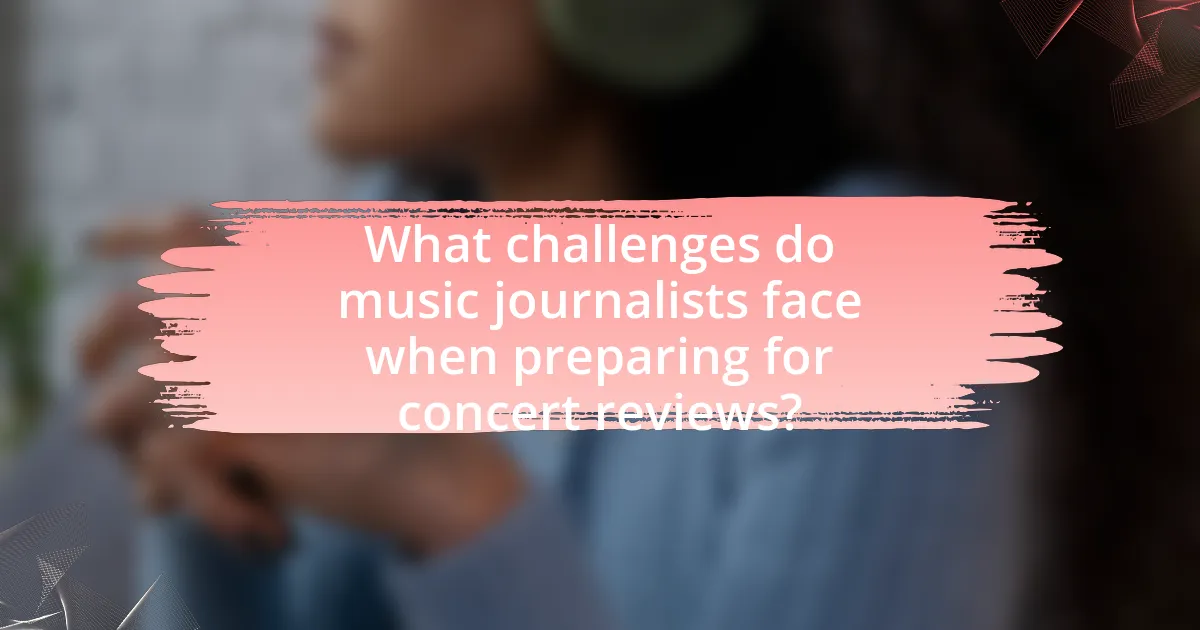
What challenges do music journalists face when preparing for concert reviews?
Music journalists face several challenges when preparing for concert reviews, including time constraints, access to the event, and the need for accurate representation of the performance. Time constraints often arise from tight deadlines that require journalists to write and submit their reviews shortly after the concert ends, limiting their ability to reflect deeply on the performance. Access to the event can be problematic, as journalists may struggle to secure press passes or face restrictions on where they can position themselves during the concert, which affects their ability to capture the atmosphere and nuances of the performance. Additionally, accurately representing the performance requires a balance between personal opinion and objective critique, which can be difficult to achieve, especially in the context of a live event where emotions and audience reactions play a significant role.
How do time constraints affect the preparation process?
Time constraints significantly impact the preparation process for music journalists by limiting the time available for research, analysis, and writing. When journalists face tight deadlines, they often prioritize essential information, which can lead to a more superficial understanding of the concert and the artist. For instance, a study by the Pew Research Center found that 63% of journalists reported feeling pressured by deadlines, which can result in less thorough fact-checking and fewer interviews with sources. This pressure can compromise the depth and quality of the concert review, as journalists may rely on pre-existing knowledge or quick online searches rather than comprehensive preparation.
What strategies can journalists use to manage tight deadlines?
Journalists can manage tight deadlines by prioritizing tasks, utilizing effective time management techniques, and leveraging technology for efficiency. Prioritizing involves identifying the most critical elements of a story and focusing on those first, ensuring that essential information is reported promptly. Time management techniques, such as the Pomodoro Technique, can enhance focus and productivity by breaking work into intervals with short breaks, allowing journalists to maintain high levels of concentration. Additionally, using technology, such as mobile apps for note-taking and editing, can streamline the writing process and facilitate quick access to information. These strategies are supported by studies indicating that effective time management can improve performance and reduce stress in high-pressure environments.
How do last-minute changes impact concert coverage?
Last-minute changes significantly disrupt concert coverage by altering the planned narrative and logistics for journalists. These changes can include unexpected setlist modifications, artist cancellations, or venue adjustments, which require journalists to quickly adapt their reporting strategies. For instance, if a headlining artist cancels shortly before the concert, journalists must shift their focus to the replacement act or the implications of the cancellation on audience expectations. This adaptability is crucial, as timely and accurate reporting is essential in the fast-paced environment of live music events. Additionally, last-minute changes can lead to incomplete or inaccurate coverage if journalists do not have sufficient time to gather new information or conduct interviews, ultimately affecting the quality and reliability of their reviews.
What ethical considerations must music journalists keep in mind?
Music journalists must prioritize accuracy, fairness, and respect for artists when reporting. Accuracy ensures that the information presented is truthful and reflects the artist’s work accurately, preventing misinformation. Fairness involves providing balanced coverage that acknowledges different perspectives, avoiding bias that could misrepresent the artist or their music. Respect for artists includes considering their privacy and the potential impact of reviews on their careers, which is crucial in maintaining ethical standards in journalism. These considerations are essential for fostering trust between journalists, artists, and audiences, ultimately contributing to a responsible music journalism landscape.
How do conflicts of interest arise in concert reviews?
Conflicts of interest in concert reviews arise when a music journalist has personal or financial ties to the artists, promoters, or venues being reviewed. These relationships can lead to biased reporting, as the journalist may feel pressured to provide favorable coverage to maintain access or support. For example, if a journalist is sponsored by a record label or has a friendship with a band member, their objectivity may be compromised, resulting in reviews that do not accurately reflect the concert’s quality. This situation is particularly concerning in the music industry, where promotional relationships are common, and transparency is crucial for maintaining credibility.
What guidelines should journalists follow to maintain objectivity?
Journalists should adhere to guidelines such as verifying facts, presenting multiple viewpoints, and avoiding personal bias to maintain objectivity. Fact verification ensures that the information reported is accurate and credible, which is essential in journalism. Presenting multiple viewpoints allows for a balanced representation of the story, giving audiences a comprehensive understanding of the topic. Avoiding personal bias involves recognizing and setting aside personal opinions or emotions that may influence reporting. These practices are supported by the Society of Professional Journalists’ Code of Ethics, which emphasizes the importance of accuracy, fairness, and impartiality in journalism.
How do music journalists handle negative reviews?
Music journalists handle negative reviews by providing constructive criticism while maintaining professionalism. They focus on specific elements of the music, such as songwriting, performance, and production quality, to articulate their viewpoints clearly. For instance, a journalist may highlight a lack of originality in an artist’s work or point out technical flaws in a live performance. This approach not only informs readers but also respects the artist’s effort. Additionally, many journalists strive to balance their critiques with acknowledgment of any positive aspects, ensuring that their reviews are fair and nuanced. This method is supported by industry standards that emphasize ethical journalism and the importance of fostering a constructive dialogue between artists and audiences.
What approaches can journalists take to write constructive criticism?
Journalists can adopt several approaches to write constructive criticism, including focusing on specific aspects of a performance, using objective language, and providing actionable feedback. By concentrating on elements such as vocal performance, stage presence, and audience engagement, journalists can offer detailed insights that enhance the critique. Objective language helps to minimize personal bias, allowing readers to form their own opinions based on the facts presented. Additionally, providing actionable feedback, such as suggesting areas for improvement, empowers artists to grow and develop their craft. These methods not only foster a more positive dialogue but also contribute to the overall development of the music industry.
How can journalists balance honesty with respect for artists?
Journalists can balance honesty with respect for artists by providing truthful critiques while acknowledging the artist’s creative intentions and efforts. This approach involves framing feedback constructively, focusing on specific elements of the performance rather than personal attacks. For instance, when reviewing a concert, journalists can highlight both strengths and areas for improvement, ensuring that their honesty does not undermine the artist’s work. Research indicates that constructive criticism fosters a more positive dialogue between artists and journalists, promoting mutual respect and understanding in the music industry.
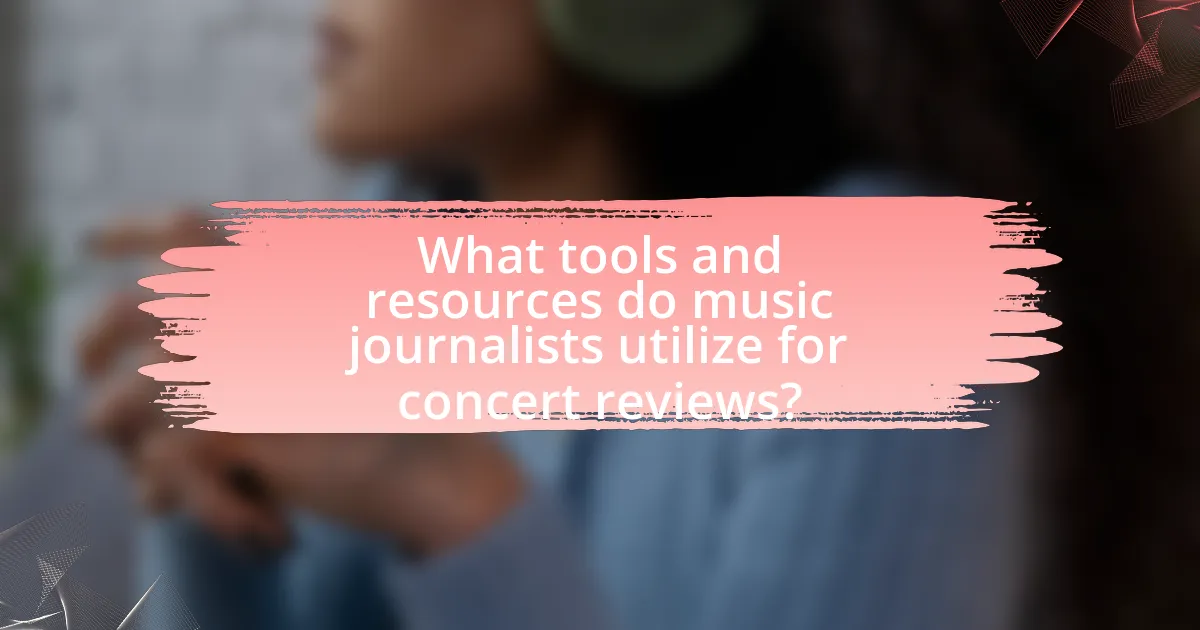
What tools and resources do music journalists utilize for concert reviews?
Music journalists utilize a variety of tools and resources for concert reviews, including digital audio recorders, cameras, and social media platforms. Digital audio recorders allow journalists to capture live performances and interviews accurately, while cameras enable them to document the event visually. Social media platforms serve as real-time sources for audience reactions and updates, enhancing the review’s context. Additionally, music journalists often refer to setlists, press releases, and artist biographies to provide informed commentary, ensuring their reviews are comprehensive and engaging.
What technology aids music journalists in their preparation?
Music journalists utilize various technologies to aid in their preparation, including digital audio recorders, music streaming services, and social media platforms. Digital audio recorders allow journalists to capture interviews and live performances with high fidelity, ensuring accurate quotes and sound quality. Music streaming services provide access to a vast library of songs and albums, enabling journalists to familiarize themselves with an artist’s work before a concert. Social media platforms facilitate real-time updates and interactions with fans and artists, offering insights and context that enhance the journalist’s understanding of the event. These technologies collectively enhance the efficiency and depth of music journalism.
How do recording devices enhance the review process?
Recording devices enhance the review process by allowing music journalists to capture high-quality audio and detailed notes during concerts. This capability enables journalists to accurately recall performances, lyrics, and audience reactions, which are crucial for crafting comprehensive reviews. Studies show that audio recordings can improve the accuracy of reporting by providing a reliable reference point, reducing the likelihood of misinterpretation or memory bias. Additionally, the ability to replay specific segments allows for a more nuanced analysis of the performance, leading to richer and more informed critiques.
What role do apps and software play in organizing concert notes?
Apps and software play a crucial role in organizing concert notes by providing structured platforms for data collection, categorization, and retrieval. These digital tools enable music journalists to efficiently record observations, setlists, and personal impressions during live performances, ensuring that all relevant information is easily accessible for later review. For instance, applications like Evernote and Notion allow users to create organized notebooks and tags, facilitating quick searches and streamlined note management. This efficiency is essential for journalists who often work under tight deadlines, as it allows them to focus on content creation rather than manual organization.
What sources of information do music journalists rely on?
Music journalists rely on a variety of sources for information, including press releases, artist interviews, social media, and music industry publications. Press releases provide official announcements and updates directly from record labels or artists, while interviews offer personal insights and context about the music and the artist’s creative process. Social media platforms serve as real-time sources for news, fan reactions, and promotional content. Additionally, music industry publications, such as Billboard and Rolling Stone, offer analysis, reviews, and trends that inform journalists about the current landscape of the music scene. These sources collectively ensure that music journalists have accurate and comprehensive information for their concert reviews.
How do press releases and promotional materials assist in concert coverage?
Press releases and promotional materials assist in concert coverage by providing essential information about the event, including details such as the date, location, lineup, and any special features. These materials serve as a primary source for journalists, ensuring accurate reporting and context for the concert. For instance, a press release may highlight the significance of a headlining artist or the theme of the concert, which helps journalists frame their coverage effectively. Additionally, promotional materials often include quotes from artists or organizers, enhancing the narrative and providing insights that enrich the review. This structured information streamlines the preparation process for music journalists, allowing them to focus on analysis and audience engagement rather than gathering basic facts.
What value do interviews with artists provide for concert reviews?
Interviews with artists provide essential insights that enhance the depth and authenticity of concert reviews. These conversations allow journalists to capture the artist’s perspective on their performance, creative process, and emotional connection to the music, which adds context to the review. For instance, when an artist shares their motivations or experiences related to specific songs, it enriches the audience’s understanding and appreciation of the live performance. This firsthand information can also reveal behind-the-scenes stories that engage readers and create a more vivid narrative around the concert experience.
What best practices should music journalists follow for effective concert reviews?
Music journalists should focus on providing a balanced and detailed account of the concert experience for effective reviews. This includes capturing the atmosphere, performance quality, and audience reaction. Specific best practices involve arriving early to observe the venue and setup, taking notes during the performance, and conducting post-show interviews with artists or attendees to gain additional insights.
Additionally, journalists should strive for clarity and conciseness in their writing, using vivid descriptions to convey the energy of the performance while avoiding overly technical jargon that may alienate readers. Citing specific songs performed and notable moments enhances credibility and engages the audience.
Research indicates that reviews that incorporate both subjective impressions and objective details tend to resonate more with readers, as they provide a comprehensive view of the concert experience.
How can journalists ensure their reviews are informative and engaging?
Journalists can ensure their reviews are informative and engaging by conducting thorough research and incorporating personal insights. Researching the artist’s background, previous works, and the context of the concert allows journalists to provide depth and relevance, making the review more informative. Additionally, sharing personal experiences and emotional reactions during the concert can create a connection with readers, enhancing engagement. For instance, a study by the Pew Research Center found that readers are more likely to engage with content that includes personal anecdotes and relatable experiences. This combination of factual information and personal narrative helps create a compelling review that resonates with the audience.
What tips can help journalists improve their concert review writing skills?
To improve concert review writing skills, journalists should focus on thorough preparation, active listening, and vivid descriptions. Thorough preparation involves researching the artist’s background, previous performances, and setlists to provide context. Active listening during the concert allows journalists to capture the nuances of the performance, such as vocal delivery and instrumental interplay. Vivid descriptions enhance the reader’s experience by painting a clear picture of the atmosphere, audience reactions, and the overall energy of the event. These strategies are supported by the fact that well-informed and engaging reviews attract more readership and foster a deeper connection with the audience.
